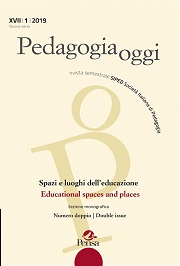The home education area as an instrument of freedom and peace: from the family environment to the Casa dei Bambini nursery school created by Maria Montessori
Abstract
The problems of bringing up increasingly ‘difficult’ children are self-evident today, as is families’ and educational/school settings’ disinclination to take on the role of educator in its broadest sense. Early childhood seems to be stifled by the ‘adult’ social demands of today’s world; young children’s need for stable points of reference, provided by the availability of spaces and times consistent with the process of their self-fulfilment, is effectively passed over. This article seeks to reflect on the desirability of identifying, in particular, the pedagogical values of the ‘home area’, which is seen as a family education environment and a place of learning and instruction that can become a genuine asset in the sphere of early childhood education. The home provides an opportunity for the child to find their voice and pursue fulfilment. And here, it would seem that the ideas of Maria Montessori have much to offer, seeing the ‘home environment’ as an ‘instrument of civil progress’ and characterizing the Casa dei Bambini as a place of liberating and peacecentric education. This is a message reiterated today not as some didactic technical contrivance, but as an educational model based on respect for the rights of the child and on the responsibility of adults.




